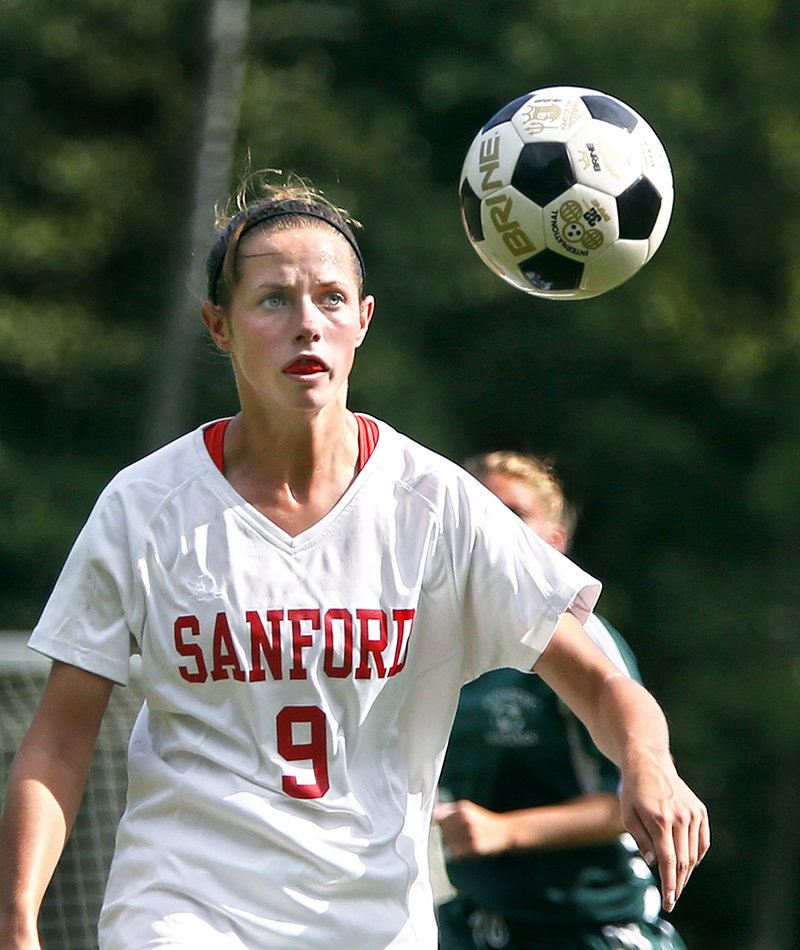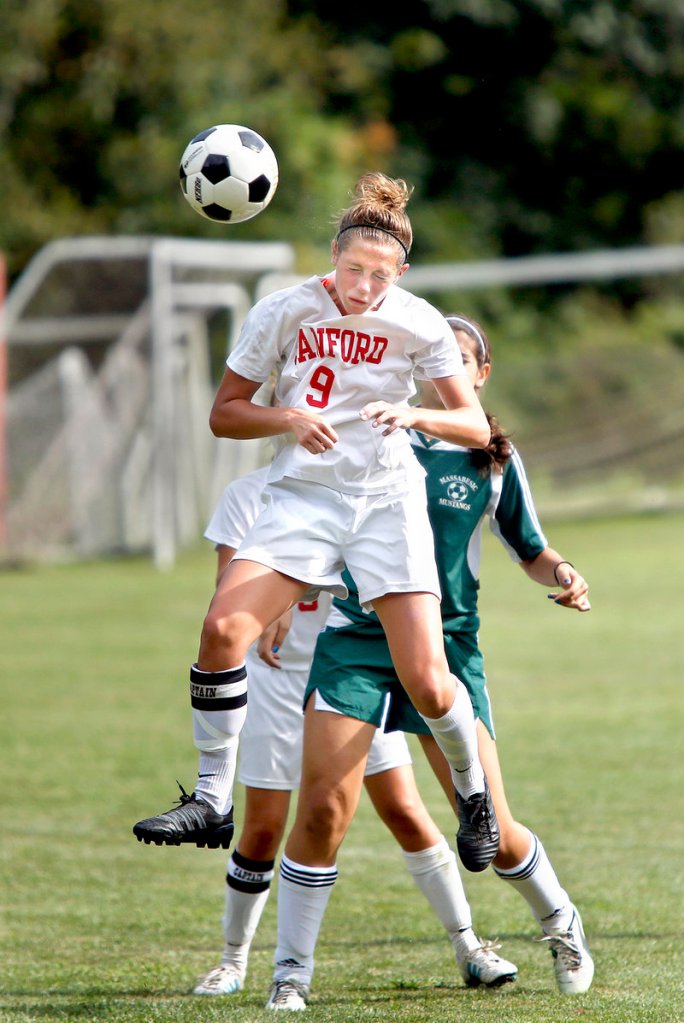SANFORD — When Taylor Littlefield, the star player of the Sanford High girls’ soccer team, missed half of last season because of a concussion, Coach Kendra Brown got a first-hand look at a phenomenon that has plagued female soccer players.
“Even when I was back in high school and in college, I hadn’t seen so many concussions,” said Brown, who grew up in Old Town, and excelled in basketball and soccer at St. Joseph’s College in Standish. “I’ve heard about them for the last couple of years and it’s a big concern.”
Football is the sport with the most concussions but girls’ soccer comes in a close second. It has seen a 58 percent increase in pediatric concussions in the past decade, mostly due to players heading the ball.
According to a recent study by the American Journal of Sports Medicine, female soccer players experience nearly twice as many concussions as boys.
On Jan. 1, a Maine law will go into effect requiring schools to have a concussion policy for all athletes. A committee is working on the wording of the regulation.
The Maine Principals’ Association already requires high school coaches to receive training to recognize the symptoms of concussion and warns them of the dangers of players returning too soon after an incident.
Littlefield’s case appears to be a classic.
“One practice we were working on headers and Coach wanted me to do the demonstration because I typically take a majority of the headers in the game,” she said.
“It was kind of repetitive, and I kept on doing it and doing it. I never thought anything of it because I’m always taking headers.”
After the drill, Littlefield didn’t feel quite right.
“It just started to hurt for a little bit so I sat out for a few minutes and then I came back in,” she said. “The next day we had a game. I played the game but I didn’t feel (like) myself. I still played and I had a couple of headers in the game, then I asked for a sub. I didn’t feel right.”
It was the first time Littlefield, who had started every game for the Spartans since joining the team as a freshman, had asked to be removed.
“She never asks for a sub,” Brown said, “but she came out and stood bent with her hands on her knees and I asked her, ‘What’s going on?’ She said she was little dehydrated. She drank a little water and went back in, but she wasn’t quite herself.”
The next day Littlefield had difficulties during a team workout in the weight room.
“I took a few bench presses,” she said. “Then I just sat there staring at the wall. Coach asked me, ‘Are you all right?’ and I said, ‘I just don’t feel right.’ She had a player take me to the trainer and (she) checked me out and said, ‘Yep, you’re out for a while. You’ve got a concussion.’ “
Littlefield never lost consciousness.
“It was just headaches, constant headaches,” she said.
“I just wasn’t feeling myself, a little spacey, not able to focus much.”
Littlefield missed one week of school and was unable to play for nearly three weeks.
“While I was out, it was rest,” she said. “Sleep. Eat. Sleep. Eat. Waking up to eat and then going back to bed.”
Littlefield, who intends to play college soccer after graduating next June, received medical clearance to return last fall.
Some doctors have proposed a complete ban of heading for the sport, but Littlefield said it’s definitely part of the game and she hasn’t stopped using her head to redirect the ball.
“Maybe if it’s a long punt, I’m a little hesitant not to go right with my head. Maybe I’ll knock it down with my chest, use my body,” she said.
“But goal kicks or corner kicks, I’ll still head the ball. It’s a major part of my game, I think.”
Brown has taken steps to educate her players and their parents about the dangers of concussions.
Before practices began last month, a nurse who specializes in the treatment of concussions came to talk about them.
In addition, the Sanford players do resistance training twice a week, designed to strengthen their neck muscles.
“They say that’s a part of it because girls have weaker neck muscles,” Littlefield said.
Littlefield, 17, said she knows of a player from another team who has had to give up soccer because she sustained repeated concussions.
“I just can’t imagine being told I can’t play sports for the rest of my life,” she said.
“It’s scary how dangerous the brain can be.”
Staff Writer Paul Betit can be contacted at 791-6424 or at: pbetit@pressherald.com
Twitter: PaulBetitPPH
Send questions/comments to the editors.




Success. Please wait for the page to reload. If the page does not reload within 5 seconds, please refresh the page.
Enter your email and password to access comments.
Hi, to comment on stories you must . This profile is in addition to your subscription and website login.
Already have a commenting profile? .
Invalid username/password.
Please check your email to confirm and complete your registration.
Only subscribers are eligible to post comments. Please subscribe or login first for digital access. Here’s why.
Use the form below to reset your password. When you've submitted your account email, we will send an email with a reset code.